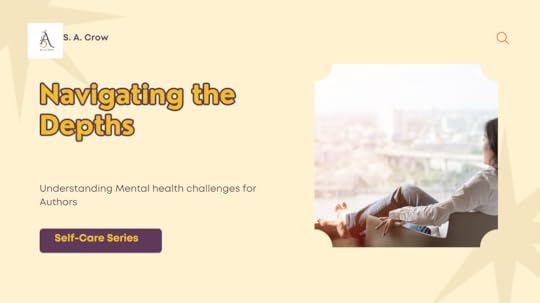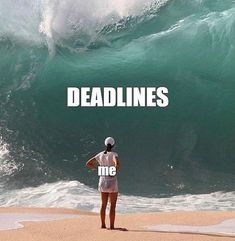Navigating the Depths: Understanding Mental Health Challenges for Authors

This is the second installment in my “Self-Care for Authors series” of blog posts. You can find the first one in the series The Write Way to Self-Care: How Authors can Prioritize Wellness in their Writing Routine post. Let’s explore the mental health challenges that authors face and come up with self-care strategies to tackle them.
I’ve encountered some mental health challenges in my four years as an author. I’ve faced various issues like depression, self-imposed deadlines, burnout, anxiety, rejection, and feeling overwhelmed.
Many authors face issues like anxiety, depression, and imposter syndrome in the writing community. I hope that in this blog post you can see that you are not alone and find some ways to cope with these common mental health struggles.
The Writer’s Mind: Common Mental Health ChallengesLet’s look into the writer’s mind and dive deep into the challenges that we face.
Anxiety
Anxiety can be related to deadlines, writer’s block, and performance pressure. We’ve all been there the blank screen or white sheet of paper that mocks you.

According to the National Institute of Mental Health NIH, occasional anxiety is a normal part of life. When anxiety is more than temporary worry or fear, you might have an anxiety disorder. This is when the anxiety does not go away and can get worse.
Some symptoms of anxiety:
Feeling restless, wound-up, or on-edge,
Being easily fatigued
Having difficulty concentrating (foggy brained)
Being irritable
Having headaches, muscle aches, stomachaches, or unexplained pains.
Difficulty controlling feelings of worry
Having sleep problems, such as difficulty falling or staying asleep
What are some of the risk factors for anxiety?
genetic and environmental factors can contribute to the risk of an anxiety disorder and vary for everyone;
shyness
feeling distressed or nervous in new situations or new projects
exposure to stressful and negative life or events
a history of anxiety in biological relatives
Depression
Aka major depression, major depressive disorder, or clinical depression. Is common and it can cause severe symptoms affecting how you feel, think, and handle daily activities; like sleeping, eating, or working.
According to the NIH, doctors diagnose women with depression more often than men.
Wordsrated.com has a great Author Demographics article where they collected author statistics from the publishing industry and as of 2021 50.45% of authors identify as women and 49.55% identify as men.
This doesn’t mean men are less likely to be depressed but that they are more likely to not recognize or talk about depression.
Studies show higher rates of depression in the LGBTQI+ community.
What can depression look like:
Persistent sad, anxious, or “empty” mood
Feelings of hopelessness or pessimism
Feelings of irritability, frustration, or restlessness
Feelings of guilt, worthlessness, or helplessness
Loss of interest or pleasure in hobbies and activities
Decreased energy, fatigue, or feeling slowed down
Difficulty concentrating, remembering, or making decisions
Difficulty sleeping, waking early in the morning, or oversleeping
Changes in appetite or unplanned weight changes
Physical aches or pains, headaches, cramps, or digestive problems that do not have a clear physical cause and do not go away with treatment
Thoughts of death or suicide or suicide attempts
Increased anger or irritability
Feeling restless or on edge
Becoming withdrawn, negative, or detached
Increased engagement in high-risk activities
Greater impulsivity
Increased use of alcohol or drugs
Isolating from family and friends
Inability to meet the responsibilities of work and family or ignoring other important roles
Problems with sexual desire and performance
Depression can lead people to have negative thoughts about themselves and the world, which may include thoughts of suicide or self-harm.
Imposter Syndrome
Is the experience of feeling like a fake or phone despite any genuine success, and is common. Check out Verywellmind’s article on Imposter Syndrome and Social Anxiety disorder
Imposter Syndrome can look like
consistent self-doubt
nervousness
negative self-talk
perfectionism
feelings of worthlessness
Imposter syndrome is not an officially recognized mental illness. It’s a term used to describe feeling insecure and doubting one’s intelligence and success. Perfectionism and social factors influence it.
It’s usually linked to things like family dynamics, low self-confidence, anxiety, and gender expectations.
Cultivating Resilience and Self-CompassionResilience is the ability to adapt and bounce back from tough experiences by being flexible and adjusting to what’s happening around you.
Self-compassion means showing kindness to yourself when you feel like you’re not good enough, when you fail, or when you’re going through a tough time.
Both of these skills can be cultivated and practiced. Helping a person engage with the world, and their quality of life, by developing coping strategies.
The American Psychological Association (APA) has an article on building your resilience available here.
Dr. Kristin Neff has a Self-Compassion Test you can take here. I’ll share my results on my social media this week. Along with some self-compassion practices for you to use and learn here.
Of course don’t forget to practice self-care rituals to help cultivate resilience and self-compassion like;
meditation
pep-talks
seek social support
Managing Stress and Anxiety
Explore techniques for managing stress and anxiety specific to the writing process, such as:
Mindfulness meditation to calm the mind and increase focus.
Deep breathing exercises to reduce physiological arousal.
Setting realistic goals and prioritizing tasks to alleviate feeling overwhelmed.
The last is so important. We often face deadlines for projects. Whether others dictate these deadlines or ourselves, they can cause stress and anxiety as the due date looms large in our mind. When I wrote my first novel in my fire series Into the Fire back in 2000. I set an unrealistic deadline of finishing the edits and format done in less than six months. As a new author with dyslexia, I didn’t realize that the editing process would take me longer and require multiple passes before I could even think about formatting. When I couldn’t attain this goal, I fell into a deep depression and contemplated giving up.
Lucky for myself and my readers, I didn’t give up. Instead, I set more achievable goals and asked my friends for help. Now, I have three published novels in the series and I’m currently working on my urban fantasy series using the pen name Ann Crow.
Rejection and criticism, whether helpful or malicious, will be a part of every authors career. Researchers have found evidence that being rejected isn’t so different from the pain of physical injury. It has a serious impact on your psychological state and can influence emotion, cognition and even physical health.
Some people are more sensitive to rejection than others. People who have rejection sensitive are so fearful of rejection that it can impact their daily lives. This is also known as Rejection sensitivity. I recommend checking out verywellmind’s article on this topic.
It may take time, but you can heal and get over the pain and hurt feelings. So what can we do?
Learn to decipher rejection letters. Some rejection letters from literary agents aren’t helpful but instead vague, and brief. Remember that when someone is reading your work their interpretation is often based on a feeling they get about your work. We all know that feelings are fickle and can be affected by outside stimuli.
So as Nathan Bransford of nathanbransford.com article says
10 surprising facts about rejection from Psychology Today
Rejection piggybacks on physical pain pathways in the brain
Tylenol reduces the emotional pain rejection elicits
Rejection served a vital function in our evolutionary past
We can relive and re-experience social pain more vividly than we can physical pain
Rejection destabilizes our “need to belong”
Rejection creates surges of anger and aggression
Rejections send us on a mission to seek and destroy our self-esteem
Rejection temporarily lowers our IQ
Rejection does not respond to reason
There are ways to reate the psychological wounds rejection inflicts
Coping strategies for dealing with rejection and criticism like:
Reframe failure as a learning opportunity
Build a supportive network of fellow writers and mentors like a writing group
Engage in activities outside of writing to maintain perspective and resilience
Incorporating Mental Health Practices into the Self-Care RoutineWe’ve talked about several strategies to help mental well-being and creativity like
cultivating a growth mindset
practicing self-care rituals
seeking social support
meditation
deep breathing exercises
setting realistic goals
prioritizing tasks
reframe failure as a learning opportunity
building a supportive network
engaging in activities outside of writing
normalizing the idea of seeking help
Join forces with your support or writing group to devise a self-care plan that incorporates mental health practices.
mindfulness exercises
self-compassion affirmations
regular check-ins
to suggest a few ideas to get you started.


I finished watching
A Little Room for Hope
Our Dining Table
Still watching
Unknown
Kingdome
Word of Honor
Spring is Green from a Distance
Deep Night
My Demon
Dead Best Friend Forever
Something in the Rain
From Me to You
Gameboys
Playyboys

Another Love-Tom Odell
Flowers- Miley Cyrus
Sherlock cover- Stray Kids
Oasis- Sam Smith
Marry You- Bruno Mars
It will Rain- Bruno Mars
Locked out of Heaven- Bruno Mars
Your World, My World- First and Khaotung
Chronosaurus- Stray Kids
https://youtube.com/playlist?list=PLGs8q5SMjt1dhFrC_Mb58vvIdT9SkNtId&si=xx43GJCjL3fluqcT



